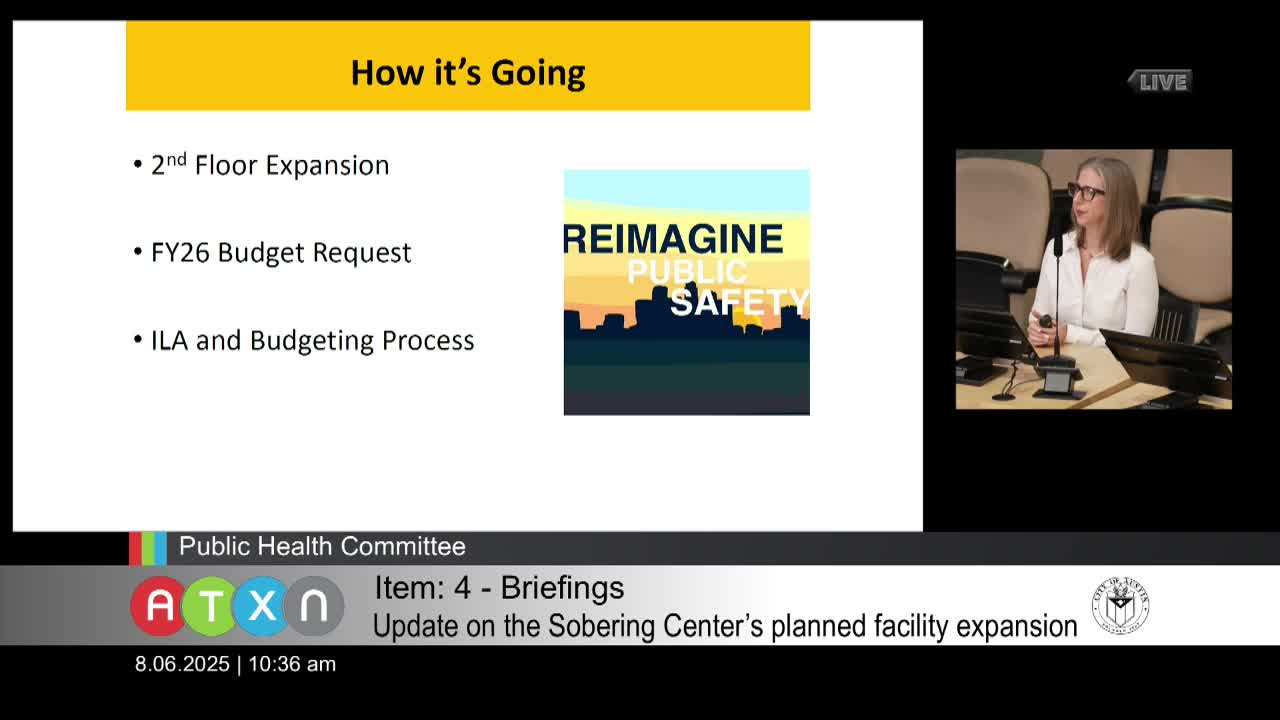Central Health Partners With Sobering Center to Expand Capacity and Upgrade Services
August 06, 2025 | Austin, Travis County, Texas
This article was created by AI summarizing key points discussed. AI makes mistakes, so for full details and context, please refer to the video of the full meeting. Please report any errors so we can fix them. Report an error »

During a recent meeting of the Austin Public Health Committee, significant discussions centered around the ongoing partnership with Central Health and the operational enhancements at the sobering center. The committee highlighted a new contract with Central Health, which allows for billing individuals eligible for the Medical Access Program (MAP) who require extended stays while seeking treatment. This collaboration aims to facilitate the opening of additional space on the second floor of the facility, addressing the urgent need for treatment options in the community.
A key focus of the meeting was the enhancement budget, which includes provisions for on-call medics. The absence of medics has previously hindered the intake process at the sobering center, creating challenges for first responders. The committee emphasized that having adequate staffing is crucial for maintaining operations and ensuring that individuals in need can receive timely assistance.
Additionally, the committee discussed a request from Council Member Vela to raise the minimum wage for all staff to $22 per hour. This initiative is part of a broader budget request aimed at improving workforce conditions and retention in public health services.
A cost-benefit analysis presented during the meeting revealed a compelling return on investment for the sobering center. For every dollar invested, the community sees a return of two dollars, underscoring the financial and social benefits of diversion programs. The analysis indicated that increasing the number of diversions directly correlates with improved financial outcomes, reinforcing the importance of high utilization rates to justify city investments.
The committee expressed a commitment to expanding services and improving conditions for individuals awaiting treatment, particularly as the demand for such services continues to grow. The discussions underscored the critical role of the sobering center in the community's public health strategy and the ongoing efforts to enhance its capacity and effectiveness. As the committee moves forward, the focus will remain on optimizing resources and ensuring that individuals in crisis receive the support they need.
A key focus of the meeting was the enhancement budget, which includes provisions for on-call medics. The absence of medics has previously hindered the intake process at the sobering center, creating challenges for first responders. The committee emphasized that having adequate staffing is crucial for maintaining operations and ensuring that individuals in need can receive timely assistance.
Additionally, the committee discussed a request from Council Member Vela to raise the minimum wage for all staff to $22 per hour. This initiative is part of a broader budget request aimed at improving workforce conditions and retention in public health services.
A cost-benefit analysis presented during the meeting revealed a compelling return on investment for the sobering center. For every dollar invested, the community sees a return of two dollars, underscoring the financial and social benefits of diversion programs. The analysis indicated that increasing the number of diversions directly correlates with improved financial outcomes, reinforcing the importance of high utilization rates to justify city investments.
The committee expressed a commitment to expanding services and improving conditions for individuals awaiting treatment, particularly as the demand for such services continues to grow. The discussions underscored the critical role of the sobering center in the community's public health strategy and the ongoing efforts to enhance its capacity and effectiveness. As the committee moves forward, the focus will remain on optimizing resources and ensuring that individuals in crisis receive the support they need.
View full meeting
This article is based on a recent meeting—watch the full video and explore the complete transcript for deeper insights into the discussion.
View full meeting
